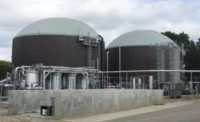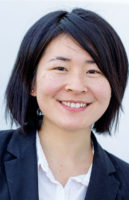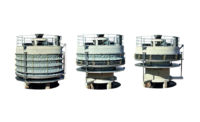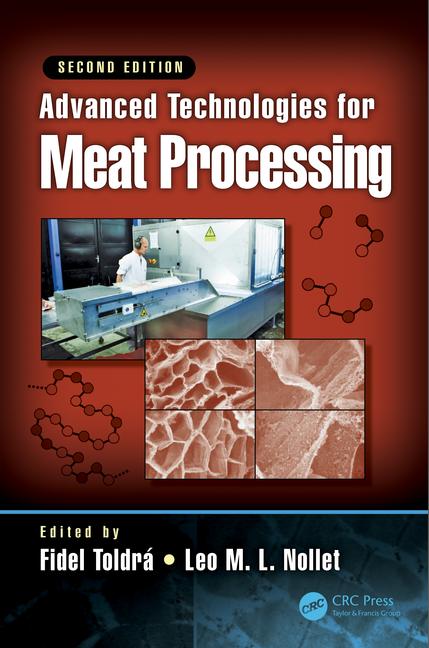Centrisys/CNP enhances lab services with advanced equipment and talent

In an industrial park located in Kenosha, Wisconsin, a group of talented individuals is working together to continue the advancement of their solids handling technologies. These engineers work for one company, but different divisions: equipment manufacturing and biosolids treatment. By combining their efforts, the Centrisys/CNP process and R&D teams are raising the bar to tackle even the most difficult sludge handling and optimization challenges.
Since 1987, Centrisys has been a manufacturer of decanter centrifuge technology for dewatering and thickening in municipal and industrial applications. The company recently added to its equipment portfolio with the award winning THK Sludge Thickener and the SP Series Screwpress. The CNP division, acquired in 2014, offers Airprex and CalPrex, nutrient recovery process technologies, and PONDUS, a Thermo-Chemical Hydrolysis Process (TCHP) for sludge optimization. Working together, Centrisys/CNP can offer customers sludge testing and analysis necessary to problem solve above and beyond the normal capabilities of a typical manufacturer.
The Centrisys/CNP lab and testing services is headed by Hiroko Yoshida, Centrisys R&D Director. Yoshida earned her PhD in Environmental Engineering from the Technical University of Denmark, a Masters in Water Resources Management and a Masters in Civil and Environmental Engineering from the University of Wisconsin-Madison. “Yoshi,” as she is called by the team, began working for Centrisys just over two years ago. She is a key developer working with customized solutions using emerging, innovative equipment and processes. Yoshida is passionate about the advantages of incorporating testing and analysis services from the very beginning of every job.
Patrick Mullen, a CNP Project Manager and Process Engineer, first joined the group in 2015. As an undergraduate at Marquette University in Civil Engineering he went on to receive his masters of science in Environmental Engineering from Marquette studying nutrient removal and recovery from municipal wastewaters. Mullen has worked in both Centrisys and CNP process groups primarily pilot testing the combined benefits of CNP’s AirPrex technology with Centrisys dewatering centrifuges. Yoshida and Mullen find working together as a team serves the clients best in determining which equipment and/or environmental technologies will fit treatment plants goals or help to solve a customer’s environmental problem.
Initially, Centrisys and CNP had individual process engineer departments; these are the engineers that are onsite for pilot testing and/or R&D analysis. But the company quickly came to the conclusion that merging these two teams allows for customers to benefit from stronger more comprehensive lab and pilot testing services.
It’s this cohesive layer, a combination of mechanical, chemical and environmental experience that benefits the Centrisys/CNP lab; having a broad understanding of not only the equipment, but the complete process and the treatment plant. It’s the synchronization between these departments, and divisions that ensure the Centrisys/CNP customers are buying the right equipment for their plant or process.
Centrisys/CNP has a true advantage in understanding the more difficult sludge applications and how to balance the biosolids process along with the equipment. They have years of experience with environmental equipment and know how the equipment handles all different types of sludge. For example, some types of sludge require pre-treatment and conditioning prior to entering a centrifuge to achieve optimal results. According to Yoshi this is critical, as she explains, “Our process engineers need to know what is being fed into the equipment in order to provide a quote, determine the size or recommend other options. In the case of a centrifuge, it’s mainly limited by flow, the solids loading and nature of how well it compacts. In the case of CNP, however it can be more complicated.”
“As utilities look to push the limits of the wastewater treatment process by adding energy and nutrient recovery to their systems, such as AirPrex, CalPrex, and Pondus, we know that these processes may change the sludge characteristics going into the centrifuge and affect conditioning strategies,” Mullen says. “By combining Centrisys and CNP lab testing protocols we can anticipate what benefits or changes we might see at full scale.”
Centrisys/CNP also offers pilot testing for the THK Sludge Thickener, another part of the biosolids process which thickens sludge. The nutrient recovery technologies AirPrex and CalPrex, especially important when dealing with industrial and digested biosolids, each have pilot testing units. “We’re more than an OEM provider,” Yoshida says. “Today, in order to sell environmental technologies you have to offer more. You need to get your hands dirty to turn innovation into reality, or help customers solve their environmental challenges.”
Centrisys/CNP will introduce the CS6-4 centrifuge at WEFTEC 2018 on October 1-3, 2018 in New Orleans. The Centrisys CS6-4 bridges the gap between benchtop studies and full scale installations. The CS6-4 continuously treats flows from 4-10 gpm, making this centrifuge a preferred alternative to a conventional laboratory centrifuge, which processes samples in batches. The CS6-4 provides scalable solid-liquid separation data to move R&D projects forward.
“Making continuous improvements in our lab and process departments are paramount to the success of Centrisys/CNP” according to Michael Kopper, CEO/Founder Centrisys/CNP. “Quality doesn’t just start in engineering or on the manufacturing floor. It starts at the very beginning and that’s in the lab or on a pilot test.”
For more information, visit www.centrisys.com.
Looking for a reprint of this article?
From high-res PDFs to custom plaques, order your copy today!






